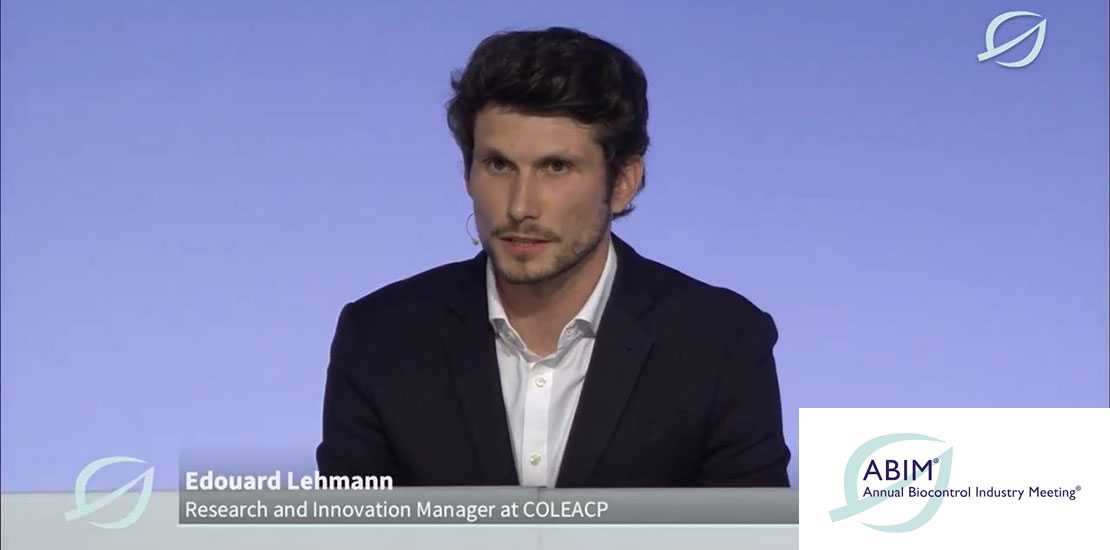Biocontrol: Opportunities and challenges in tropical horticulture
- 13/12/2021
- Posted by: Gaetan Dermien
- Category: Africa, Caribbean, News, Pacific, Switzerland

COLEACP Keynote Address at ABIM 2021
On 19–20 October, COLEACP participated in the 16th Annual Biocontrol Industry Meeting (ABIM) in Basel, Switzerland. During these two days, 970 participants from 44 nations were able to network together face-to-face, as well as listen to inspiring presentations and panel discussions. Both SMEs and large enterprises were well represented.
The programme of ABIM 2021 included a journalist-led panel discussion involving biocontrol industry leaders, food processors, NGOs and researchers on how biocontrol will help transform agriculture. Edouard Lehmann, Research and Innovation Manager at COLEACP, gave a keynote address on the role of biocontrol in African, Caribbean and the Pacific (ACP) countries.
Tropical agriculture is facing increasing challenges with climate change and high pest pressure. Regulations, markets and consumer demand are evolving, and new international initiatives such as the EU Green Deal and the Farm to Fork strategy are calling for a transformation to more sustainable food systems that also include ACP countries. Transformation of agriculture is not a one-step process – it is a transition that requires a combination of innovative solutions. Biocontrol is one element that can foster the transition to a more sustainable agriculture.
Context and challenges for IPM
Integrated pest management (IPM) still has undeveloped potential. Biocontrol can provide the tools for many elements of the IPM approach by offering technologies for surveillance and biological/chemical control of pests. Biocontrol can foster early warning, better understanding of pest pressure and dynamics, and higher efficiency through timely interventions. It can also provide alternative pest/disease control options that are safer for both operators and the environment.
COLEACP presented the results of its 2019 survey on crop production/protection issues in ACP horticulture. The 110 respondents highlighted the lack of effective, affordable crop protection technologies that support compliance with international market requirements. Although biocontrol is welcomed as a potential alternative, the associated costs, and lack of local capacity for registration and distribution in tropical areas, are still hampering mainstreaming of biocontrol approaches.
Edouard Lehmann recalled that even if they are less toxic and leave no residues, biocontrols need to be locally registered. More investment is needed in this area – from the private sector, to increase the offer of registered technologies; and from the public sector, to adapt the registration processes that are often based on chemical assessment approaches rather than being adapted to biocontrol.
Practical solutions
COLEACP is invested in this work, supporting field research to fast-track registration of effective solutions to control priority pests and diseases through the Fit For Market SPS programme. Since 2019, it has implemented 18 trials (mango, sweet corn, leafy vegetables, capsicum, etc.). The data generated will be used to register six biocontrol solutions in more than 10 countries. Additionally, COLEACP supports capacity building by developing brochures and technical guides, as well as an online database on Good Agricultural Practices (e-GAP).
Participating in ABIM also offered the opportunity for COLEACP to meet with manufacturers of innovative technologies, and to establish contacts to explore opportunities to broker innovation in ACP regions.
These activities are supported by the Fit For Market SPS programme, implemented by COLEACP within the Framework of Development Cooperation between the Organisation of African, Caribbean and Pacific States (OACPS) and the European Union.

![EU and GB approval changes (August-November 2024) 9-FFM+-[ENG]](https://news.colead.link/wp-content/uploads/2024/06/9-FFM-ENG-150x150.jpg)


